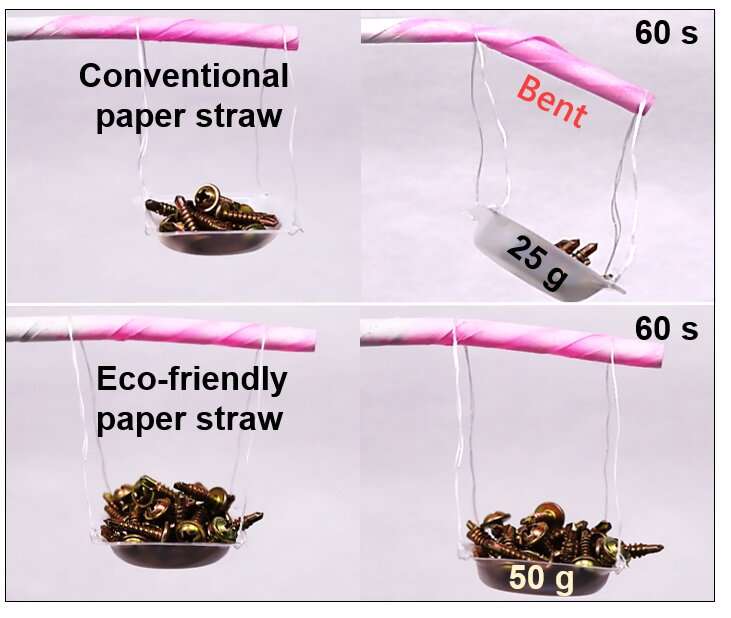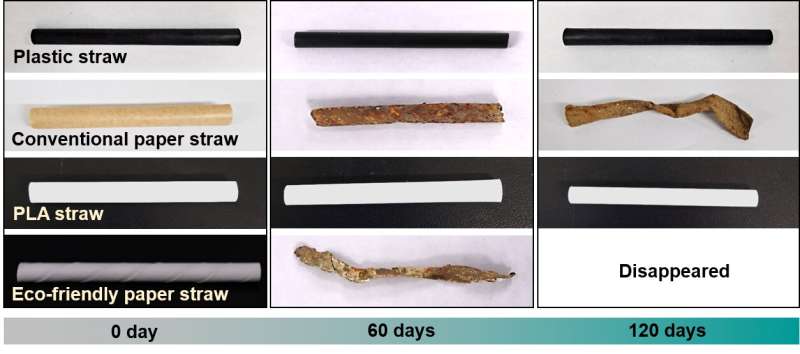This article has been reviewed according to Science X's editorial process and policies. Editors have highlighted the following attributes while ensuring the content's credibility:
fact-checked
peer-reviewed publication
proofread
Researchers develop 100% biodegradable paper straws that do not become soggy

The paper straws that are currently available are not entirely made of paper alone. Straws made with 100% paper become too soggy when they come in contact with liquids and cannot function as straws. Accordingly, their surfaces should be coated.
The most commonly used coating materials for paper straws are polyethylene (PE) or acrylic resin—the same materials used for making plastic bags and adhesives. Paper cups are also coated with the same materials as paper straws. A large number of previous studies have reported that polyethylene coating on discarded paper cups can disintegrate into small particles without being fully decomposed and become microplastics. Moreover, these paper products are made with paper and plastics (two very different materials) and thus it is difficult to recycle them.
Conventional paper straws are inconvenient to use. Upon prolonged contact with a liquid, they become soggy. And when these straws are used to drink carbonated beverages, many bubbles form due to their surface properties. Currently, polylactic acid (PLA) straws and rice straws are available in the market as alternatives to paper straws. However, PLA straws—also known as corn plastic straws—do not decompose well in the ocean. While rice straws decompose well in the environment, they have disadvantages, including higher prices due to difficulties in their mass-production and their sharp cross-sections.
The joint research team of Dr. Oh Dongyeop and Dr. Kwak Hojung of KRICT and Professor Park Jeyoung of Sogang University have developed eco-friendly paper straws that are 100% biodegradable, perform better than conventional paper straws, and can be easily mass-produced. The research is published in the journal Advanced Science.
Using their technology, the research team synthesized a well-known biodegradable plastic, polybutylene succinate (PBS), by adding a small amount of cellulose nanocrystals to create a coating material. The added cellulose nanocrystals are the same material as the main component of paper, and this allows the biodegradable plastic to firmly attach to the paper surface during the coating process.

Conventional paper straws do not incorporate a material that will strongly attach the plastic coating to the surface of the straws. Therefore the surfaces of the straws are not uniformly coated with plastic, impeding their use. The most significant limitations this creates are that the straws become soggy when a liquid touches the uncoated part and bubbles extensively form when paper straws are left in carbonated beverages. This is because the uncoated part easily combines with water, whereas the coated plastic part has the property of repelling water, causing the carbonated drink to contact the uneven surface of the paper straws.
These limitations are overcome by the new paper straws developed by our research team; they do not become soggy easily or cause bubble formation in carbonated drinks because the coating material uniformly and strongly covers the surface of the straws. Also, the coating material is made of paper and biodegradable plastic and therefore will decompose and degrade completely.
The research team found that these eco-friendly paper straws maintain their physical integrity in both cold drinks and hot drinks. The team also found that the straws did not become soggy when used to stir various beverages such as water, tea, carbonated drinks, milk, and other drinks containing lipids, or upon prolonged contact with liquids. The degree of sogginess of the new paper straws and conventional paper straws was compared. The conventional paper straw was severely bent when a weight of approximately 25g was suspended after the straw was dipped in cold water at 5°C for 1 min. In contrast, the new paper straw did not bend as much even when the weight was more than 50g under the same conditions.
The newly developed straws decompose well, even in the ocean. In general, paper or plastic decomposes much more slowly in the ocean than in soil because of the ocean's low temperature and high salinity, which impede growth of microbes. The research team performed a decomposition test in a marine environment by immersing the straw samples at a depth of 1.5–2 m on the coast near Pohang, South Korea.
Regular plastic straws and corn plastic straws did not decompose after 120 days. Conventional paper straws preserved their shape and lost only 5% of their total weight. In contrast, the straws developed by the research team lost more than 50% of their weight after 60 days and decomposed completely after 120 days.
"This technology is but a small step toward the direction we need to take in this era of plastic. Turning a plastic straw we often use into a paper straw will not immediately impact our environment, but the difference will be profound over time. If we gradually change from using convenient disposable plastic products to various eco-friendly products, our future environment will be much safer than what we now worry about," said the head researcher, Dr. Oh Dongyeop.
More information: Hojung Kwak et al, Biodegradable, Water‐Resistant, Anti‐Fizzing, Polyester Nanocellulose Composite Paper Straws, Advanced Science (2022). DOI: 10.1002/advs.202205554
Journal information: Advanced Science
Provided by National Research Council of Science & Technology



















